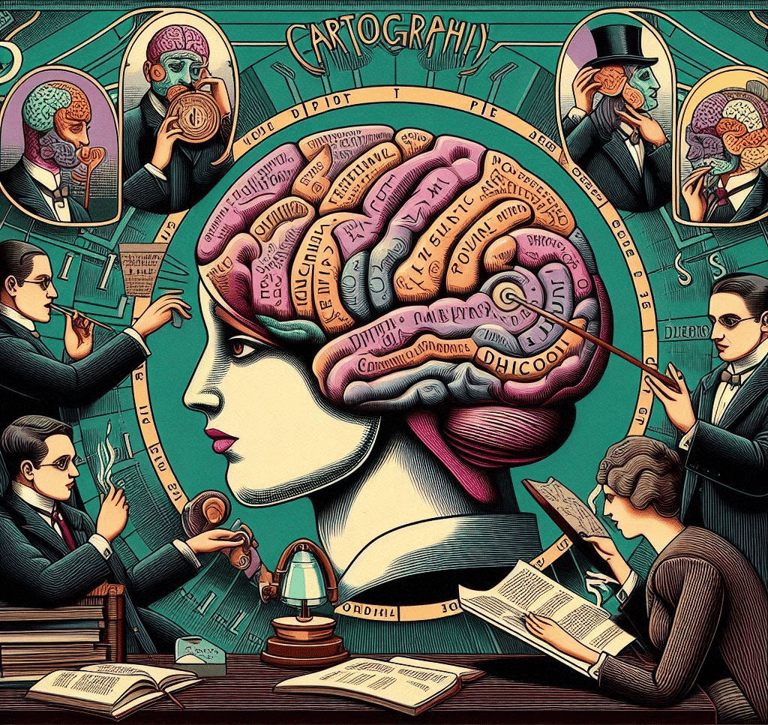Cartography for the Insane
Michio Kako, The Future Of Our Mind.
4/17/20244 min read


CARTOGRAPHY FOR THE INSANE
Audio book by Michio Kaku: The Future of Our Mind: The Scientific Challenge to Understand, Improve and, Strengthen Our Mind.
This book is highly recommended. It is amazing how our humanity is in that range, between “the past times” and the future. On the edge of definitive changes, but so incredible that they were only imagined in science fiction stories, and now, a doctor in Physical-Mathematical Sciences and Theoretical Physicist, set himself the task of telling us about some of the infinite doors that await in the future of our society.
The purpose of this publication is to question some of the possible consequences that these technologies will have if there is no adequate regulation.
Technologies that have the power to make our future a dystopia.
Michio Kaku tells a little about the development of the study of the mind, its history and how sciences such as physics have provided valuable tools for understanding the physiology of our brain and its relationship with the rest of our systems. In this process of learning and creation of knowledge, scientists found the possibility of mapping the brain, which could be directly related to a motor, cognitive response and even to characteristics of human behavior or personality. Miku tells that this is how it became common to try to explain the functioning of the brain by means of a map of the different areas that had been identified in it, but every time they wanted to go further the attempts were unsuccessful, because the picture became more complex and confusing; making the scholars of these methods were frustrated in their efforts, so it was called CARTOGRAPHY FOR THE ISANE. However, the findings that were achieved were fundamental in the understanding of human behavior, physiology and health.
A lot has been understood about our brain and behavior, thanks to the development of Functional Magnetic Resonance Imaging (fMRI), which is a technology derived from Magnetic Resonance Imaging (MRI), this, just in the last 15 years (at the date of publication of the book: 2014) and now at 25 years since then. Miku also talks about biomechanical technologies that will improve the lives of millions of people with motor disabilities, and their potential use in warfare, bionic soldiers that have the destructive capacity of tens or hundreds of men. Devices in our brains that are going to help us to learn at data download speeds, use telepathy and perhaps one day have the energy technology to perform telekinesis. There I share with you a little bit of information from the book, but don't deny yourself the joy, surprise and terror of hearing or reading it haha. It is an excellent book with a lot to say.
The motivation was that these “predictions” are made by a recognized character, with scientific weight and with the latest technological information. It was here when these dissertations came: is a person with this scientific background talking seriously about this?, I think you freak out.
What would it be like to understand the universe “like” Einstein, Hawking, Bohr, Maxwell, Pauli, Schrödinger and Newton, Michelangelo, Galileo, Da Vinci and so many others we would have liked to talk to? and apologies for hurting so many feelings, but it is impossible to name at least a decent portion of these human beings... We are already in the day when we can reconstruct our heroes thanks to the amount of historical data, databases and so many other methods used with and for artificial intelligences, such as Natural Language Processing (NLP) algorithms. We are also very close to the creation of “almost” exact copies of our minds, thanks to the development of new materials, the increase in data storage capacity and technologies that will be embedded in our brains. Probably these “copies” will not be exactly the same as our mind or consciousness(*), because there is the factor of experience, which at this point, we do not know how to unify that knowledge either. Besides, it is very difficult to understand the unity of something, by observers who are only a part of that inconceivable something; we can also say, that we are the same thing, one in miniature and the other in massiveness, if the word resembles the idea.
That is to say that we are that totality in this small individuality, could it be that our body is conscious every time an astronomically catastrophic event happens? For example, when a gravitational wave phenomenon is generated in our universe, in the giant space between our atoms and inside each atom is that perturbation of a billionth of a neutron measured or perceived, and the whole system knows that two black holes in collision occurred in an unknown past and just happened to move the space-time of our current position? And then that information is stored there, only that our consciousness has never processed it, it does not perceive it? We fall back into the usual question, the one of centuries for centuries: Who is the observer?, what is its importance?, was it necessary?, is it really a gift from God?, the vagaries of nature?... in short, let's leave it to each one to explain it as you prefer, because neither science is the limit (still or never?) to these questions. And as the technology of the mind develops, there are more answers.
All this is exciting, but it is also frightening, because as we already know, it raises very delicate ethical questions: Will be force the babies to carry a chip since their birth?, will be force to buy a security system for our thoughts and feelings, so we won't reveal our soul?, are we going to define which parts of the planet will be a war field, due to the high destructiveness of these bionic soldiers? and so many other questions, which are not only raised to generate terror, but also to generate awareness and curiosity about the subject.
And here we are, facing the unbridled eagerness that our humanity has for an absolute knowledge of the world, we continue to rummage in our brains for things that are in our soul (already defined by the way). What is the Human Being then? If at the end of the day, the human being at its core is simple, let's reduce it to a need for love, wonder at the world, purpose and peace. Even the most evil and disturbed being would surely falter at the allure of these simple nouns, if they prove their worth and authenticity.
So, let us hope that we can preserve the intimacy of our inner self. For as it is popularly said: Any resemblance to fantasy, is pure coincidence. Or, reality surpasses fantasy.
(*)About the definition of consciousness, Miku says that has been one of the most studied topic, and at the same time, the one on which there is less agreement in its definition.
